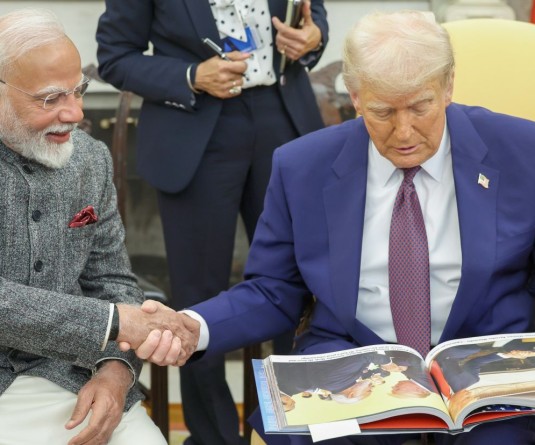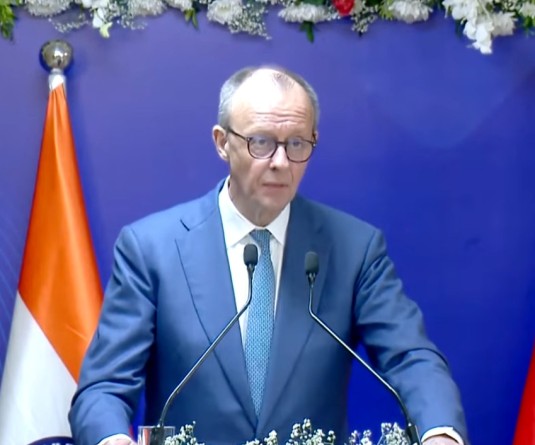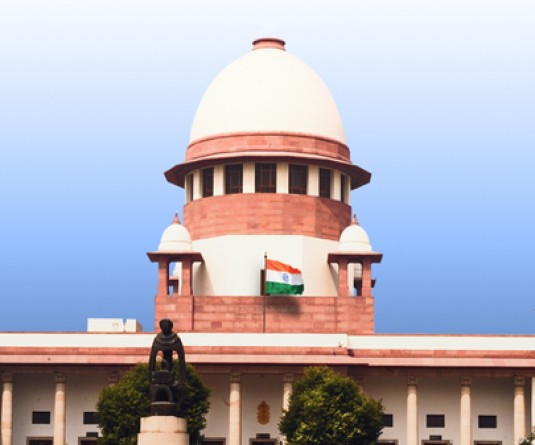
Mumbai, January 21 (Agencies): The deep striking warfare and strategic capabilities of the Indian Navy got a major boost Friday with the induction of the third fleet tanker, the state-of-the-art INS Deepak, which will be followed by a similar one in nine months. The Italian-built tanker will enable warships operate for prolonged periods on the high seas without returning to harbour for replenishment or refuelling.
A fleet tanker is as much useful to warships as mid-air refuellers are for fighter jets for extending their operational range. Defence Minister A.K. Antony who flew in from New Delhi, commissioned the ship at the Naval Dockyard here.
‘It is a great moment for the Indian Navy,’ Antony said, adding the year will see more acquisitions and commissionings to strengthen the maritime security (of India). The defence minister said India’s continued presence in the Indian Ocean waters necessitates pursuing ‘our strategic and diplomatic interests’.
‘A ship such as Deepak, with an ability to sustain the Indian fleet at sea for prolonged periods, is a vital asset to ensure Indian Navy’s continuous presence in our area of interest,’ Antony said in his short speech before unveiling the ship’s name plaque, to formally induct the INS Deepak into the Indian Navy.
The 175-metre long and 25-metre wide ship has a capacity to carry 17,900 tonnes of cargo, including 15,500 tonnes of fuel. It can refuel five ships at a time with a fueling speed of 1,500 tonnes per hour. The earlier two tankers - INS Jyoti and INS Aditya - could refuel at the speed 300 tonnes per hour. The new tanker has state-of-the-art aviation facilities and can operate various types of helicopters.
With a full-load displacement of 27,500 tonnes, the 175-metre long ship is also equipped with four AK-630 guns and has a chaff launcher system for close in defence and electronic surveillance equipment with endurance of 10,000 nautical miles at a speed of 16 knots. The ship has been built by Italian company Fincantieri in a record time of 27 months after the April 2008 signing of the contract worth 159.32 million euros.
Indian Navy Chief Admiral Nirmal Verma, praising the ship said the force was ‘very proud’ of the tanker that ‘is vastly different from her predecessor and brings with her a host of impressive capabilities to the Indian Navy, in the form of her modern refueling and replenishment equipment, her state-of-the-art bridge and flag bridge, and her two operations rooms’. The ship has elaborate medical facilities and large storage spaces that add to her versatility to undertake a variety of missions over and above those of a fleet tanker.
Its induction, Verma said, would add ‘significantly to the Indian Navy’s ability to conduct and sustain operations distant from our coast, a factor that is central to the navy’s ability to protect and promote India’s maritime interests and national security in today’s world.’
The commissioning of the tanker is part of Indian Navy’s endeavour to strengthen its blue-water capabilities and protect the nation’s geo-strategic and economic interests from the Strait of Hormuz to the Strait of Malacca. INS Deepak has indigenous weapons, communication equipment and electronic surveillance system outsourced from Indian companies. The ship has had its share of controversy with the Comptroller and Auditor General of India last year critcising the government for alloting the contract to the Italian firm that has allegedly used inferior-grade steel in the manufacture of the tanker.
The CAG, in August 2010, said the original Request for Proposal (RFP) had a mandatory stipulation requiring the use of ‘DMR 249A or equivalent grade steel’ in the construction of the tanker. ‘Fincantieri’s proposal was stated to be compliant with the RFP conditions. However, the firm proposed to use DH 36 steel in place of DMR 249A steel,’ the CAG said.
A fleet tanker is as much useful to warships as mid-air refuellers are for fighter jets for extending their operational range. Defence Minister A.K. Antony who flew in from New Delhi, commissioned the ship at the Naval Dockyard here.
‘It is a great moment for the Indian Navy,’ Antony said, adding the year will see more acquisitions and commissionings to strengthen the maritime security (of India). The defence minister said India’s continued presence in the Indian Ocean waters necessitates pursuing ‘our strategic and diplomatic interests’.
‘A ship such as Deepak, with an ability to sustain the Indian fleet at sea for prolonged periods, is a vital asset to ensure Indian Navy’s continuous presence in our area of interest,’ Antony said in his short speech before unveiling the ship’s name plaque, to formally induct the INS Deepak into the Indian Navy.
The 175-metre long and 25-metre wide ship has a capacity to carry 17,900 tonnes of cargo, including 15,500 tonnes of fuel. It can refuel five ships at a time with a fueling speed of 1,500 tonnes per hour. The earlier two tankers - INS Jyoti and INS Aditya - could refuel at the speed 300 tonnes per hour. The new tanker has state-of-the-art aviation facilities and can operate various types of helicopters.
With a full-load displacement of 27,500 tonnes, the 175-metre long ship is also equipped with four AK-630 guns and has a chaff launcher system for close in defence and electronic surveillance equipment with endurance of 10,000 nautical miles at a speed of 16 knots. The ship has been built by Italian company Fincantieri in a record time of 27 months after the April 2008 signing of the contract worth 159.32 million euros.
Indian Navy Chief Admiral Nirmal Verma, praising the ship said the force was ‘very proud’ of the tanker that ‘is vastly different from her predecessor and brings with her a host of impressive capabilities to the Indian Navy, in the form of her modern refueling and replenishment equipment, her state-of-the-art bridge and flag bridge, and her two operations rooms’. The ship has elaborate medical facilities and large storage spaces that add to her versatility to undertake a variety of missions over and above those of a fleet tanker.
Its induction, Verma said, would add ‘significantly to the Indian Navy’s ability to conduct and sustain operations distant from our coast, a factor that is central to the navy’s ability to protect and promote India’s maritime interests and national security in today’s world.’
The commissioning of the tanker is part of Indian Navy’s endeavour to strengthen its blue-water capabilities and protect the nation’s geo-strategic and economic interests from the Strait of Hormuz to the Strait of Malacca. INS Deepak has indigenous weapons, communication equipment and electronic surveillance system outsourced from Indian companies. The ship has had its share of controversy with the Comptroller and Auditor General of India last year critcising the government for alloting the contract to the Italian firm that has allegedly used inferior-grade steel in the manufacture of the tanker.
The CAG, in August 2010, said the original Request for Proposal (RFP) had a mandatory stipulation requiring the use of ‘DMR 249A or equivalent grade steel’ in the construction of the tanker. ‘Fincantieri’s proposal was stated to be compliant with the RFP conditions. However, the firm proposed to use DH 36 steel in place of DMR 249A steel,’ the CAG said.
‘No proposal to reduce military in Kashmir’
Mumbai, January 21 (Agencies): Defence Minister AK Antony Friday said if there was any reduction of security forces in Jammu and Kashmir it would be of paramilitary troopers as there was no proposal from “people who work on the ground” to reduce military personnel in the troubled state.
“There was some confusion. The announcement that was made was about paramilitary forces,” Antony told reporters onboard INS Deepak, a fleet tanker he commissioned earlier in the day.
He said the Defence Ministry had received no proposal for reduction in military personnel in the state. “At the present we don’t have any such proposal. People who are working on the ground, they will recommend (such proposals).”
Echoing what Army Chief General VK Singh had said, Antony asserted that the security grid - the Unified Command - in Jammu and Kashmir should take any such decision. The ground working force, he said, “In Jammu and Kashmir is the Unified Command. They have not recommended (any reduction),” he said.
Antony said there was no contradiction in this regard between the Defence Ministry and the Home Ministry that had earlier this month announced a 25 percent cut in security forces in Jammu and Kashmir. They were talking about the security forces and not the Army, he said.
“There was some confusion. The announcement that was made was about paramilitary forces,” Antony told reporters onboard INS Deepak, a fleet tanker he commissioned earlier in the day.
He said the Defence Ministry had received no proposal for reduction in military personnel in the state. “At the present we don’t have any such proposal. People who are working on the ground, they will recommend (such proposals).”
Echoing what Army Chief General VK Singh had said, Antony asserted that the security grid - the Unified Command - in Jammu and Kashmir should take any such decision. The ground working force, he said, “In Jammu and Kashmir is the Unified Command. They have not recommended (any reduction),” he said.
Antony said there was no contradiction in this regard between the Defence Ministry and the Home Ministry that had earlier this month announced a 25 percent cut in security forces in Jammu and Kashmir. They were talking about the security forces and not the Army, he said.






